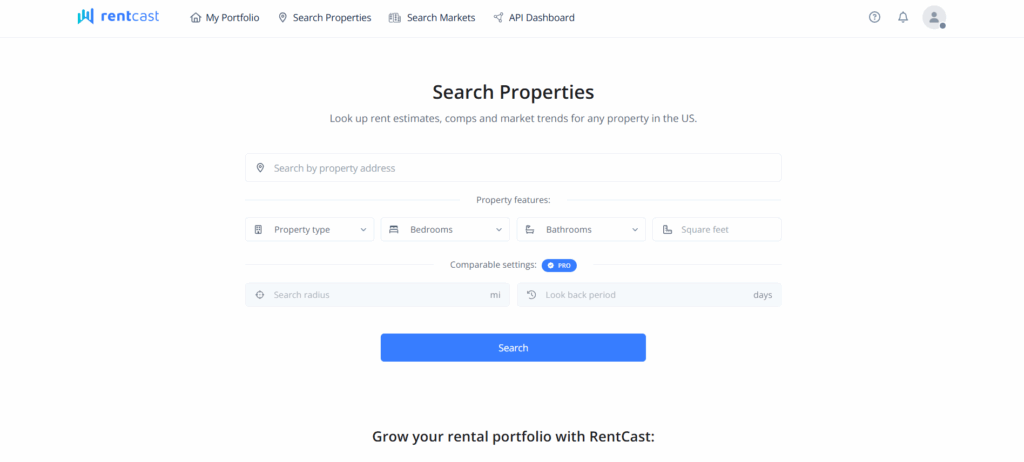Setting the right rent price can make or break your property investment returns. Property managers and real estate investors face a constant challenge: price too high, and you’ll struggle with extended vacancies; price too low, and you’re leaving money on the table every month. This is when rent calculators like RentCast come in handy.
This guide examines RentCast’s core features, integration capabilities, and pricing structure. You’ll discover how this platform compares to competitors, and learn whether RentCast delivers the accuracy and insights needed to maximize your rental income.
What is RentCast?
RentCast is a rental analysis platform built for real estate investors and large property managers who want data-driven insights without enterprise-level complexity. It offers rent estimates, rental comps, and market trends in an easy-to-use dashboard. The platform is designed less for tenants or casual users and more for people managing multiple units who want to keep an eye on market shifts and their portfolio’s performance.
RentCast Features

- Rental Estimates: Automated models that generate rent ranges based on property details like location, bedrooms, bathrooms, and square footage.
- Rental Comparables: Side-by-side comparisons of similar nearby properties, with filters for key attributes.
- Portfolio Tracking: The ability to track multiple properties, receive alerts on when to adjust rents, and monitor rental income potential over time.
These features help landlords see where their current rents stand and how their portfolio might perform in changing market conditions.
Pros vs Cons of RentCast
Pros:
- Easy to use, with a clean interface.
- Portfolio tracking and alerts are helpful for investors with multiple properties.
- Provides local insights beyond national averages.
Cons:
- Data accuracy can be inconsistent because RentCast does not disclose its sources.
- Rent estimates are automated, with no option to manually adjust comparables.
- Better suited for landlords and investors who need a ballpark than for professional property managers who need precise, defensible pricing.
How Much is RentCast?
RentCast offers tiered pricing, generally starting with a free option for limited access, and the paid plan is $12/month, billed annually. While affordable, the tradeoff comes in accuracy and transparency compared to more advanced rent analysis tools.
What are the alternatives to RentCast?
If you’re looking for alternatives to RentCast, the main options property managers and landlords often compare are CompIQ by Dwellsy, Rentometer, and the Zillow Rent Calculator. Each offers a different approach: CompIQ emphasizes transparent, verified data and accuracy; Rentometer provides quick ballpark checks; and Zillow focuses on renter-facing comparisons with broad coverage. Here’s a detailed breakdown:
1. CompIQ by Dwellsy
CompIQ by Dwellsy is a strong alternative to RentCast for property managers who value accuracy and transparent data sources. Unlike RentCast’s black-box approach, CompIQ draws all comps directly from verified property management systems via Dwellsy’s platform with millions of properties, giving users confidence in where the numbers come from. Its intuitive interface and reporting tools make it easy to justify pricing decisions to owners and renters.
Best for: Small to mid-sized property managers who prioritize pricing accuracy and data transparency.
2. Rentometer
Rentometer serves as an alternative to RentCast for those who want a faster, simpler way to check local rents. By entering an address, landlords can instantly see a rent range and neighborhood medians, making it useful for quick checks without the setup of larger platforms. That way, Rentometer appeals to new landlords who want ballpark figures without diving into complex data or integrations.
Best for: New landlords who need quick rental price ballparks in dense neighborhoods.
3. Zillow Rent Calculator
Zillow’s rent calculator provides another alternative to RentCast, but with a renter-first design. It delivers quick estimates and allows comparisons of up to five properties with photos, leveraging Zillow’s brand familiarity and broad coverage. While it lacks the professional-grade precision and flexibility that property managers require, it works well for those who want to understand renter-facing pricing and market perception.
Best for: Renters who want a simple, branded comparison tool to see how much they should expect to pay.




